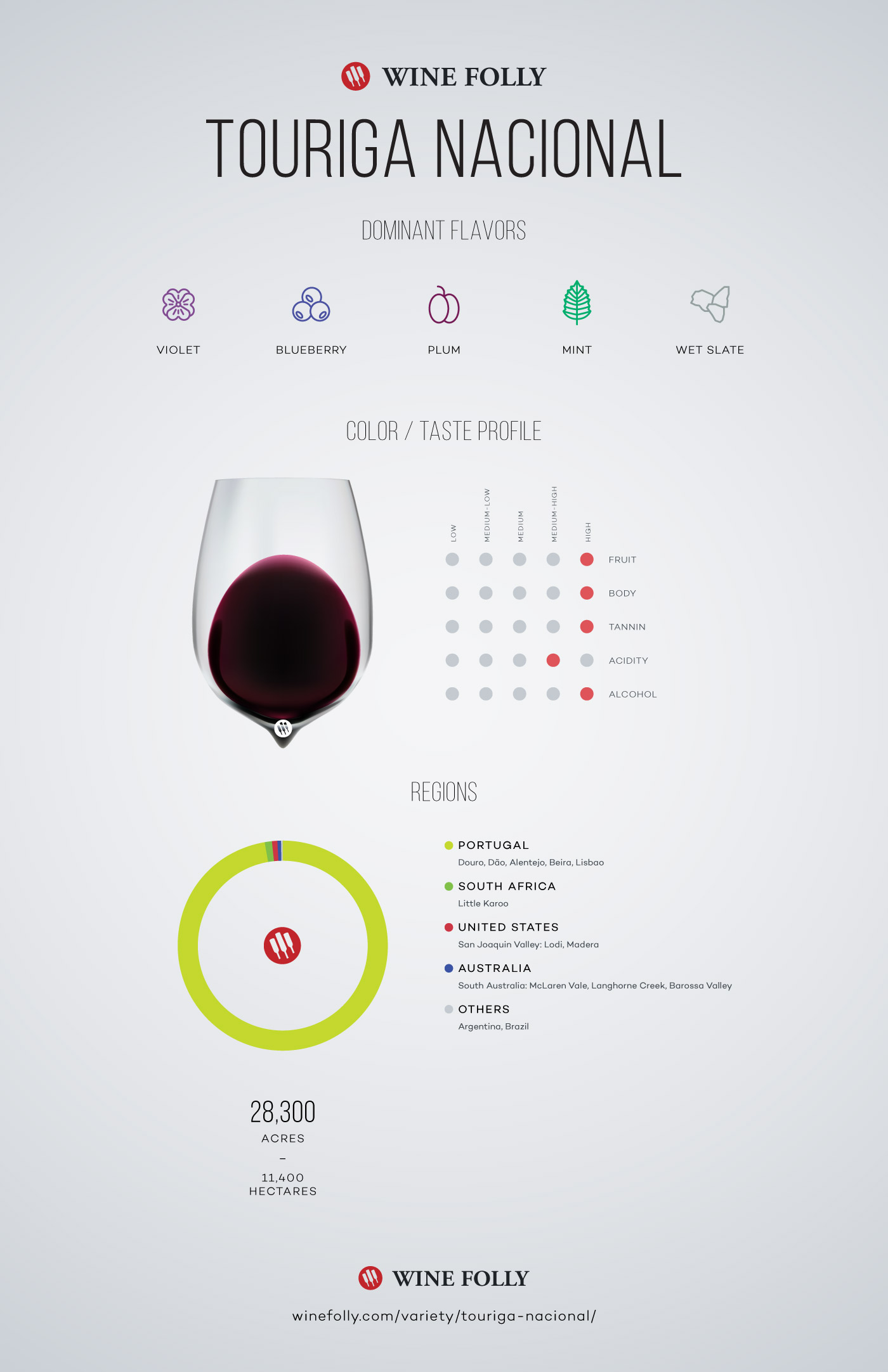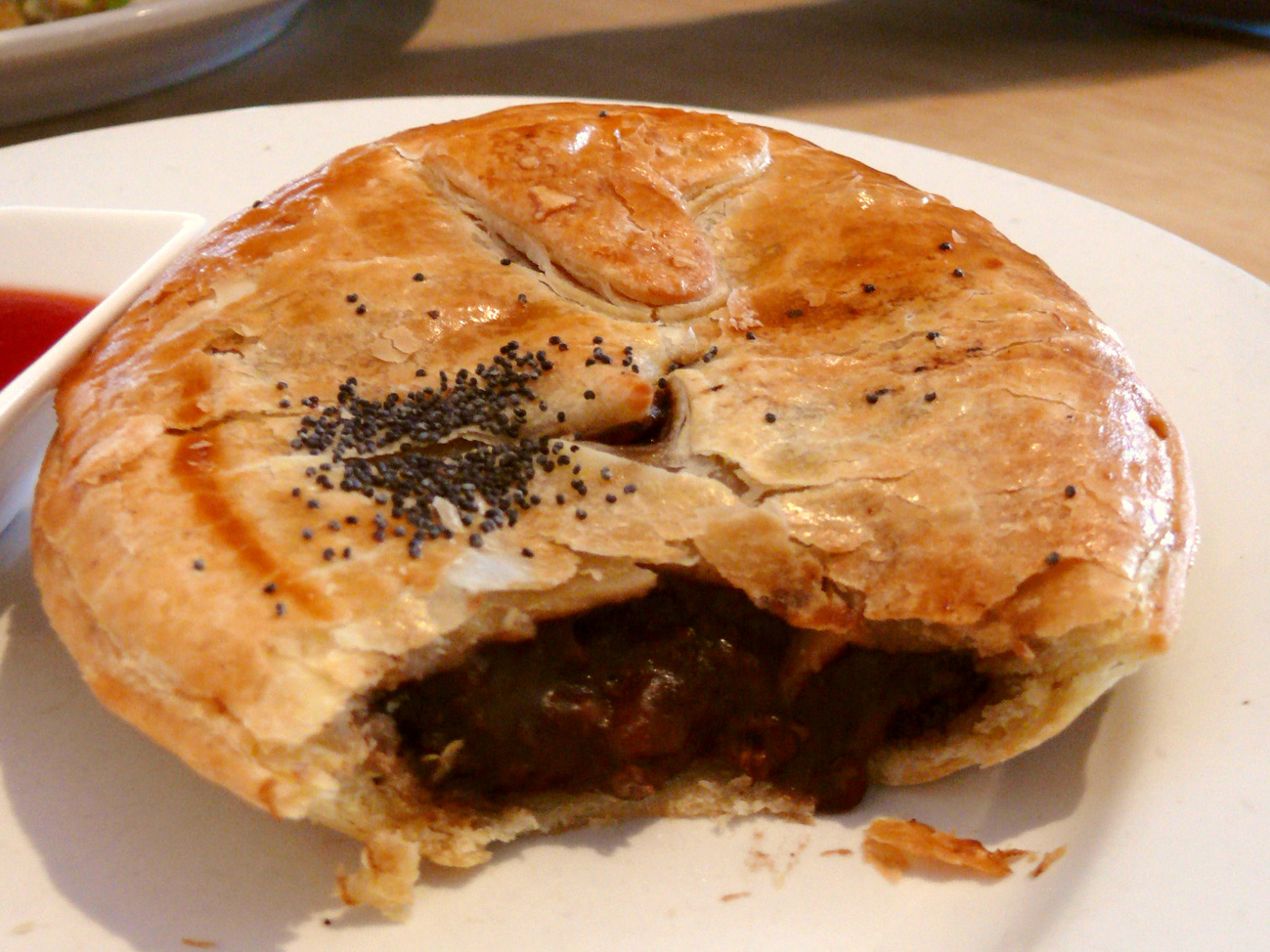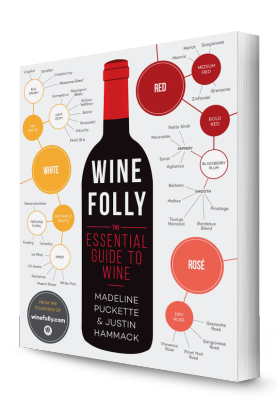Touriga Nacional (“tor-ee-gah nah-see-un-nall”) is a thick-skinned grape from Portugal that makes full-bodied red wines with aging potential like Cabernet Sauvignon. This unsung grape variety is most common as a blending grape in Port wine and has only recently been championed as a dry red wine. For those who love bold red wines, Touriga Nacional offers profound depth of flavor at an obscenely good value.
Guide to Touriga Nacional Wine

See more information on Touriga Nacional on page 156 of Wine Folly: The Essential Guide to Wine
Bold and lush, Touriga Nacional is for people who go for full-bodied red wines from warm climates. For example, dry wines made with Touriga Nacional have been likened to the infamous Napa Cabernet and opulent Barossa Shiraz. The one trait that Touriga Nacional really sizes up is its bold tannin, a trait that softens with aging.
When you taste this wine, expect palate-coating and tooth-staining richness of blueberry, plum, blackberry, bittersweet cocoa and often a subtle stimulating flavor of mint and violet. The texture of the wine is balanced (when it’s well-made) and when you brush your tongue to the roof of your mouth, you’ll notice fine gravelly tannins. When made into a dry wine, Touriga Nacional is resilient to oak aging and takes it very well, offering up aromas of toasted marshmallow, vanilla and nutmeg. It’s not uncommon to find Touriga Nacional blended with other grapes (like Touriga Franca and Tempranillo) which can help balance the boldness of the wine with cinnamon spice and red-fruit flavors.
Expect to Spend
- $10–$12 for a great quality Portuguese red wine blend made in part with Touriga Nacional
- $36–$50 for a serious single-varietal Touriga Nacional wine from the Douro or Dão regions of Portugal
Food Pairing with Touriga Nacional

A lamb pie with mint would be an awesome pairing with Touriga Nacional wine. by Mr & Mrs Stickyfingers
Touriga Nacional, in its boldness, stands quite well on its own as a cocktail wine, however there are certain foods that will calm its bold tannins and bring out its lushness. Go for rich fatty foods that can absorb the tannin but keep the spicing simple (and not too salty) in order to not overwhelm the floral aromas of mint, bergamot and violet. One way to do this might be to soften the flavors of a main with a cream-driven side dish like a yoghurt sauce.
Examples
- Meat
- Aromatic Thai Spiced Beef with Coconut Rice, Cuban-Style Pork with Beans and Plantains, Barbecue Beef, Fennel-Spiced Pork Sausages, Beef Tenderloin with Blue Cheese Mashed Potatoes, Beef Stroganoff, Meat Pie
- Cheese
- Mozzarella, Fontina, Gruyere, Swiss, Stilton/Blue (as a flavoring), Brie, Farmer’s Cheese, Yoghurt, Cream Cheese, Coconut Milk, and Cream
- Herb/Spice
- Black Pepper, Mint, Coriander, Fennel, Coconut, Shallots, Chives, Parsley, Cilantro, Dill, Tarragon, Basil, Bay Leaf, Lemongrass, Nutmeg, Poppyseed, Ajwain, Green Cardamom (sparingly)
- Vegetable
- Potato, Roasted Cauliflower, Garlic Scape, Bamboo Shoot, Turnip, Sunchoke, Celeriac, Beluga Lentil, Black Bean, Pinto Bean, White Bean, Cashew, Almond, Apple, Passion Fruit and Lemon
Touriga Nacional: Portugal’s Prestige Grape
Touriga Nacional is indigenous to Portugal and grows predominantly in the Douro region where it is used as a primary blending grape in Port wines. While the wine is lovely as a dessert wine, it has repeatedly impressed critics as a dry red wine. Here are a few notes on what to expect from Touriga Nacional based on the region it’s grown.
Douro

Wines will be nearly opaque in color with aromas of blueberry, black currant, violet, vanilla, and subtle notes of roasted meat and freshly wetted concrete. The wines are big and bold with a smooth finish. Vineyards primarily consisting of decomposing schist are found in the steep valley of the Douro river and do not receive irrigation. Thus, they produce small, highly concentrated wines.
Average price: $12 (very fine examples upwards of $60)
Dão

The Dão is much higher in elevation than the Douro and also receives quite a bit more rainfall. Due to these regional traits, the wines tend to be a touch lighter with higher acidity than their Douro siblings. Wines will offer up aromas of boysenberry, black cherry and raspberry with stronger herbal/floral notes of violet, bergamot and Earl Grey tea. The region’s soils are sandy granite which could attribute to why the aromas in Dão Touriga Nacional lean towards the floral end of the spectrum.
Average price: $12 (very fine examples upwards of $60)
Touriga Nacional in Blends
When searching for Touriga Nacional, you’ll find that several wines are a blend of several grapes. It’s not uncommon to see Tempranillo (aka Aragonez, Tinta Roriz), Touriga Franca and even Castalão blended with Touriga Nacional. These grape varieties will typically add acidity and red fruit flavors to help balance the boldness of Touriga Nacional.

Get the Wine Folly book
A visual guide to wine with 230+ pages of infographics, data visualization and wine maps opening you up to the world of wine. Wine Folly: The Essential Guide to Wine is the perfect companion for your wine lifestyle.